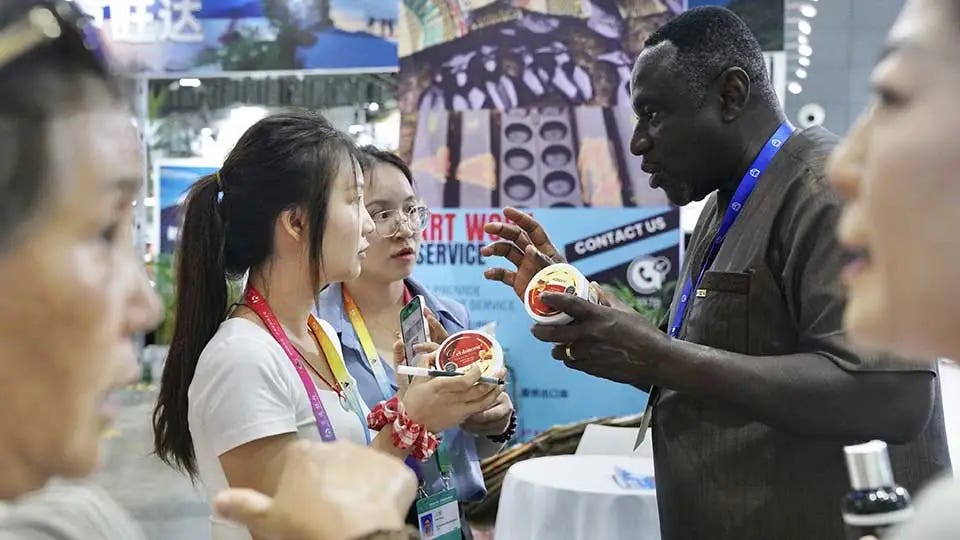By Christian-Géraud Neema Byamungu
At a recent ministerial meeting in the central Chinese city of Changsha, Beijing announced an ambitious new phase of its engagement with Africa: the possibility of eliminating customs duties on exports from all 53 African countries (except for Eswatini, which maintains diplomatic relations with Taiwan). While many media outlets quickly presented this as a done deal, the reality is more nuanced: China says it is “ready” to act, subject to negotiations and the establishment of a new economic partnership framework.
This framework, the China-Africa Economic Partnership for Shared Development, lies at the heart of Beijing’s latest strategy. Through its naming and ambition (as expressed in the FOCAC final declaration last September), it echoes a well-known, if imperfect, historical precedent: the ACP Agreements between the European Union and the African, Caribbean, and Pacific (ACP) states.
The EU’s ACP initiatives rested on three pillars: trade, politics, and development. In their trade and development components, they gave rise to the Economic Partnership Agreements (EPAs), the Cotonou Agreement in 2000, which promised duty-free access to European markets while allowing African countries to protect certain sectors. In practice, however, they struggled to deliver on those promises.
China’s proposal, born within the FOCAC framework, appears to mirror the EU’s earlier approach, but it is embedded in radically different political, economic, and institutional dynamics.
In the economic partnership that China is suggesting, whose contents and scope remain unknown (and to which African countries have not yet formally responded since the September announcement), we can undoubtedly expect Beijing to require some form of reciprocity from the African side, not only for political convenience but also to comply with WTO rules. And if similar measures are to be negotiated, several factors will need to be considered to ensure a successful partnership.
The Trade Imbalance
At the core of Sino-African trade lies a persistent imbalance: African countries primarily export raw materials (such as ores, timber, and oil), while importing finished goods from China. Beijing’s offer to extend zero-tariff treatment to all African countries appears as a gesture toward rebalancing that equation.
But it comes with conditions. As laid out in both the 2023 Beijing Declaration and the Changsha statement, China’s market opening is contingent on signing this new framework agreement. And unlike FOCAC itself, this would be an institutional commitment, potentially binding, aimed also at protecting Chinese investments.
It remains to be seen whether African countries are ready to enter such a framework, and if it can truly be mutually beneficial.
Lessons from the EU
The EU’s EPA approach – favoring regional blocs over bilateral deals – yielded mixed results. Many African countries resisted, fearing that market opening would outstrip their industrial capacities and erode customs-duty revenues. The result was a fragmented landscape, uneven participation, and unfulfilled promises.
China may encounter similar obstacles: despite lifting duties for 17 least-developed countries, trade volumes have barely budged. Most of those countries do not produce the kinds of goods in demand by Chinese consumers.
China will expect some form of reciprocity from African markets; however, removing duties on Chinese imports could devastate local industries and drain government revenues derived from import taxes.
Indeed, China is not merely a trading partner – it is the world’s leading exporter of manufactured goods. Even without preferential treatment, its products already dominate many African markets, often outcompeting local producers.
A Complex Market
Four major concerns complicate African adoption of China’s proposal:
Manufacturing capacity: Most African countries lack the industrial infrastructure to take full advantage of duty-free access to China.
Revenue loss: Duty reductions could sharply reduce national income in economies reliant on import taxes.
Trade disruption: Countries like Nigeria and South Africa—with relatively developed manufacturing sectors—would risk being flooded by cheaper Chinese goods. Indeed, Nigeria had previously refused to sign the Cotonou Agreement within ECOWAS, citing the need to protect its local industry.
Continental priorities: The African Continental Free Trade Area (AfCFTA) is still being implemented; a sweeping bilateral deal with China could undermine its cohesion and spark intra-African tensions.
Yet there is an opportunity: industrial cooperation. If China were to support African manufacturing development through direct investment, technology transfer, or joint ventures, the proposed partnership could go beyond market access and foster genuine economic transformation.
Building on last year’s Beijing Declaration, China had already expressed its willingness to support African industrialization, provided adequate safeguards are put in place to protect its investments.
A Test of Strategy and Trust
China has traditionally favored bilateral agreements over regional approaches; yet this strategy may limit the scope and coherence of the new framework. Small African markets may hold little appeal, while larger economies could fear domestic upheaval. The challenge lies not only in defining incentives but also in establishing robust institutions and lasting relationships of trust.
The question remains: will China succeed where the EU struggled? That will depend not only on Beijing’s willingness to offer concrete support for African development but also on African governments’ ability to coordinate, negotiate, and define the terms of a partnership that truly benefits both sides.
Absent that, the risk is the same as before: grand promises, unrealized potential, and yet another missed opportunity for equitable globalization.
Christian-Géraud Neema Byamungu is the Africa editor at The China-Global South Project



